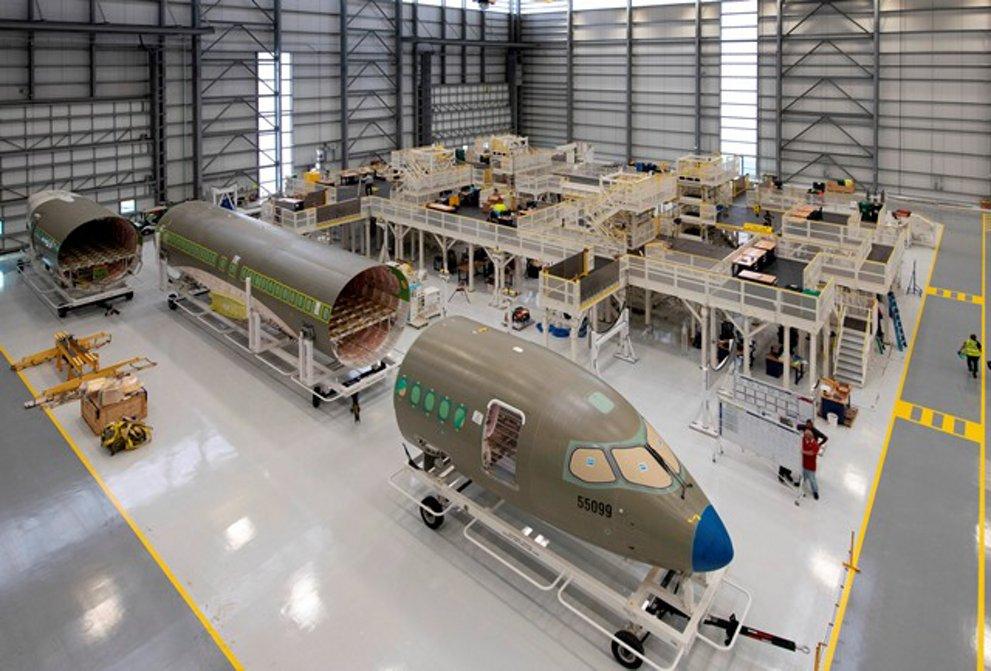
LYON, France—As production rates have suddenly decreased amid the COVID-19 crisis, Airbus’ suppliers are in a difficult but still viable situation, according to Guillaume Faury, the airframer’s CEO.
On the company’s half-year earnings media conference call July 30, Faury was asked about the ability of suppliers to get through the crisis and Airbus’ assistance. His answer was relatively reassuring, describing supply chain survival as achievable and alluding to the industry’s efforts to support it.
Airbus has 3,200 suppliers of aircraft parts “and we need all of them in a good shape,” he said.
The current on-time delivery performance of some suppliers has improved because the lower production rate has given them the opportunity to catch up with delays. But they could be seen as being in the “eye of the storm.” After the transition from high to low production levels, “they will suffer from financial pressure,” Faury said.
Airbus has intensified the exchange of information to better anticipate the situation of the supply chain, he explained. The manufacturer “intervened in some cases” to help with a particular predicament.
“With this level of production, it is very likely the supply chain will make it, we are in an area that is ... challenging but manageable,” Faury said.
To support ailing small and medium enterprises (SME), a dedicated fund has just been formed in France. ACE Management, a subsidiary of Parisian asset manager Tikehau, was chosen to manage the new ACE Aéro Partenaires fund and has invested €230 million ($270 million)—more than the expected €100 million. Other contributions have come from Airbus, Dassault, Safran, Thales and the French government for a combined €630 million. The ultimate objective is to raise a total €1 billion.
The fund will help those SMEs that need equity capital and may be instrumental in the overdue consolidation of the supply chain. “We will now get to work to help secure, reorder and strengthen the supply chain of this highly innovative industry,” said Ace Management executive chairman Marwan Lahoud, who was previously Airbus’ chief strategy and marketing officer.
At the end of June, 145 Airbus commercial aircraft could not be delivered because of the pandemic. Nevertheless, Airbus aircraft deliveries are gradually resuming.
“We delivered 36 aircraft in June and keep recovering in July,” Faury said. “You will see the majority of our usual customer names by the end of the year,” including Chinese carriers, he added.
The airframer is now operating in a “new normal” mode, as production rate cuts have been implemented. “Our industrial system, including our supply chain, has adjusted to new levels and we are producing according to the new plan,” Faury said. Drastic measures have begun to yield results, such as partly offsetting lower revenues, he pointed out.
“We face a difficult situation with uncertainty ahead, but with the decisions we have taken, we believe we are adequately positioned to navigate these challenging times in our industry,” Faury said.
During the third quarter, Airbus is bringing production and deliveries to the same level. Major adaptations happened in the second quarter and minor ones are now occurring every month, Faury said. The A350’s monthly production has been cut to five, down from six.
Ramping up again is not expected in 2020 or early 2021. “We believe single-aisle production will increase in 2022 and it will take more time for widebodies,” Faury said. “It will be a long and slow recovery.”
In Toulouse, a new A320/A321 final assembly line (FAL), coming in addition to two existing A319/A320 FALs, was expected to deliver its first aircraft, an A321, in 2022. That plan is now on hold. A member of the French parliament, Toulouse area deputy Mickael Nogal, has launched a campaign to firm up the project.
He is supported by the local chamber of commerce, business lobbying groups Medef, CPME and UIMM, as well as the CFE-CGC, CFTC and FO workers unions. Their stated goal is to obtain a commitment from Airbus about an A321 FAL in Toulouse and financial incentives from local authorities. Nogal emphasized the FAL would generate employment and would help weakened suppliers.
Airbus’ commercial aircraft deliveries were halved in the first six months of this year, compared to the same period in 2019. A total 196 aircraft were delivered, comprising 11 A220s, 157 A320 family aircraft, five A330s and 23 A350s. After the addition of a net eight aircraft orders in the second quarter, the backlog stood at 7,584 commercial aircraft, as of June 30.
Airbus’ consolidated net loss amounted to €1.9 billion in the first half. That came against a backdrop of slashed revenues, down to €18.9 billion—a substantial drop on the €30.9 billion the company achieved in the first half of 2019. Those numbers combine Airbus’ civil, defense and space activities, but the decline in commercial aircraft business drove the slump.





